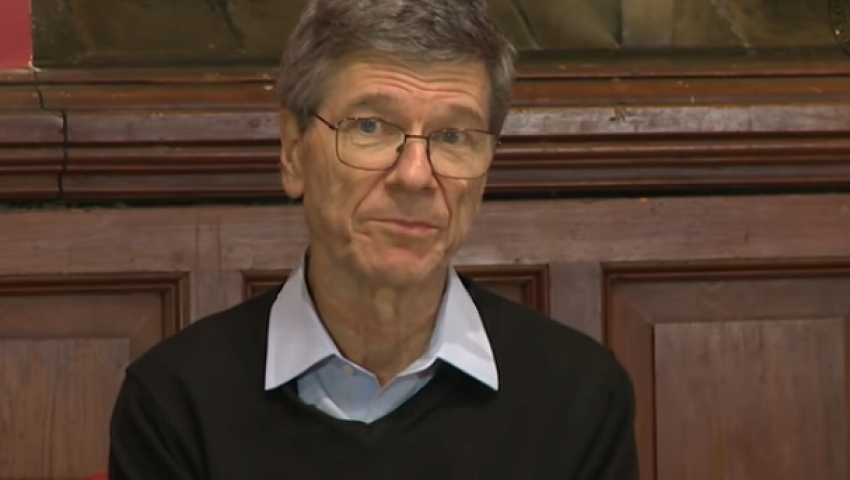Prof. Jeffrey Sachs: Bulgaria must adopt the euro, but having a common currency is not easy
A new global financial system with higher taxes for the rich is needed so that the world can tackle poverty, says the economist

Source: Stoppad YouTube / OxfordUnion
It would be good for Bulgaria to become part of the eurozone. This is the right move. It is also good that Europe continues to expand the role of the euro. Such a recommendation was made by the economist Prof. Jeffry Sachs to our country and the European Union in an interview with Nova TV. But at the same time, he warned that being part of a single currency system is not an easy task. And this has become very clear since the financial crisis of 2008, when the eurozone almost collapsed. According to Prof. Sachs, the main reason for this situation at the time was the wrong policy of the European Central Bank (ECB) for years - too many austerity, too little funding. All this has even put the survival of the eurozone at stake. According to him, things stabilized only when Mario Draghi became President of the ECB (November 1, 2011 - ed. Note) and then the eurozone managed to recover. "So having a eurozone is not easy, but it is a great advantage for Europe if it is managed properly. And this requires good leadership at the ECB. So there is work to be done, "said the economist. But his principled advice is for Bulgaria to join the eurozone and for the EU to expand.
Sachs denied that the adoption of the euro has anything to do with the deterioration of the quality of life, for which there are serious concerns in our country. But he warned that the single European monetary system must be managed and work properly, and that all its members must work for that. Because otherwise everyone in it will suffer. "If it works well, then its members thrive, or at least recover," Sachs said. He gave the example of the crisis in Greece after the global financial year 2008. "In the first years, Greece suffered terribly from the poor governance of the eurozone. But lately, the country has gained a lot from it, because now, in a better-managed eurozone, Greece can borrow at a very low price. And so it is able to finance its budget and development on very favorable terms. So there is no direct link between being a member of the eurozone and being rich or poor, "the economist said.
According to him, for Europe as a whole, it is very important to have a single currency, especially in today's world of great powers such as the United States and China. "To be a real part of Europe, in my opinion, means a lot to be part of the eurozone," Sachs said.
Regarding the global problem of poverty, the economist believes that his prediction from 2005, when he published his book "The End of Poverty" that it will end in 2025, will obviously not come true. The reason, he said, was the refusal of the great powers and their governments to follow the advice he had written in the book in question. "The main thing was to be generous and to help developing countries more so that they can invest in their children's education, in healthcare. But we live in a very selfish world. The United States, unfortunately, is very rich, but also very selfish. So many of the things they had to do were not done. And so it came to global crises, divisions and mass migration. Because we don't take care of ourselves properly. And no, we will not end global poverty by 2025", Sachs said.
He cited the example of China, which managed to end the country's extreme poverty last year. And given that 40 years ago it was an almost completely poor country. It follows that the eradication of poverty is entirely possible, but requires that policy be focused in the long term on sustainable development and not on power, on political battles and huge corruption.
For the world to tackle poverty, Sachs says, a new global financial system must be imposed that taxes rich people, billionaires and big companies. And to ensure that the proceeds from this will go to poverty reduction. The bad thing, according to the economist, is the great greed among politicians and rich people around the world, which is why the Universal Declaration of Human Rights, adopted by the UN in 1948, cannot be fulfilled, namely it aims to tackle poverty everywhere. But at the moment, the world cannot deliver on what it has promised itself, Sachs said.
